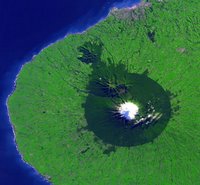No wonder Winston wants to sit on the cross-benches


 Box 1: This satellite picture of Egmont National Park and the surrounding area shows that the original native forests (dark green) of the east coast of the North Island of New Zealand have been largely replaced by argicultural pasture lands (light green). Only the circular national park boundary around Mt Taranaki appears to be providing protection against further land use transformation, and without the national park designation, even more deforestation would undoubtedly occur. The park's circular shape originates from its first protection in 1881, at which time it was specified that a forest reserve would extend from the summit of Mt. Taranaki in a 9.6 km radius. The park covers 33,534 hectares and its peak is 2518 metres above sea level.
Box 1: This satellite picture of Egmont National Park and the surrounding area shows that the original native forests (dark green) of the east coast of the North Island of New Zealand have been largely replaced by argicultural pasture lands (light green). Only the circular national park boundary around Mt Taranaki appears to be providing protection against further land use transformation, and without the national park designation, even more deforestation would undoubtedly occur. The park's circular shape originates from its first protection in 1881, at which time it was specified that a forest reserve would extend from the summit of Mt. Taranaki in a 9.6 km radius. The park covers 33,534 hectares and its peak is 2518 metres above sea level. 
| ACT | Greens | Labour | Maori Party | National | NZ First | Progressive | United | |
| ACT | - | 12% | 47% | 26% | 64% | 60% | 28% | 56% |
| Greens | 12% | - | 63% | 84% | 45% | 52% | 83% | 47% |
| Labour | 47% | 63% | - | 65% | 65% | 69% | 69% | 67% |
| Maori Party | 26% | 84% | 65% | - | 53% | 62% | 78% | 54% |
| National | 64% | 45% | 65% | 53% | - | 70% | 56% | 61% |
| NZ First | 60% | 52% | 69% | 62% | 70% | - | 61% | 67% |
| Progressive | 28% | 83% | 69% | 78% | 56% | 61% | - | 54% |
| United | 56% | 47% | 67% | 54% | 61% | 67% | 54% | - |
Although this table makes for interesting reading, sometimes a picture is even better. Its possible to turn these numbers into graph that visually illustrates the policy affinities of all the parties in a single picture. To do this we need to borrow some analysis tools used in evolutionary biology. Using standard software when can generate a graph that summarizes all these relationships by using a table of pairwise differences. It is trivial to convert Table 2 into just such a set of differences. For example the 12% similarity between Greens and ACT will convert to an 88% difference. With these differences (known in evolutionary biology as distances, and usually calculated based on the differences between pairs of DNA sequences) we can now use standard computer software to calculate a graph called a Neighbour Net, which provides a compact summary of pairwise similarities. The resulting graph (which I will dub a Policy Web) is shown in Figure 1.
